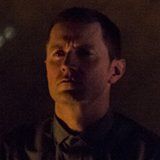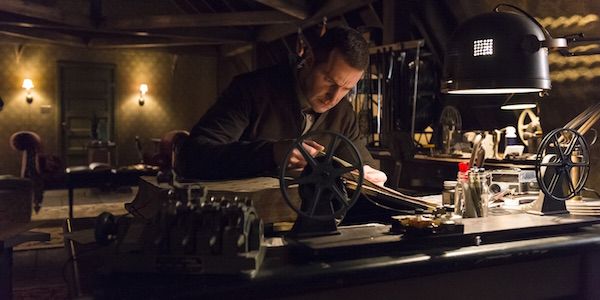Serial killer The Red Dragon makes his bloody first appearance this Saturday on NBC’s Hannibal. Last week's "Digestivo" ended when Hannibal finally surrendered to Jack – which should have close the chapter on Will Graham's involvement with the FBI and his infatuation with Dr. Lecter.
Tonight, the show flash forwards a couple of years to a point where Will has settled down and married. However, there's also a new serial killer on the loose. Originally introduced in Thomas Harris' 1981 novel Red Dragon,titular character Francs Dolarhyde slaughters entire families and leaves bite marks on his victims. This Saturday, Will once again gets sucked into an investigation – and a battle of wits with Hannibal.
Best known as Thorin Oakenshield in the Hobbit trilogy, actor Richard Armitage spoke to press on the Toronto set of Hannibal about reinterpreting the Red Dragon for television, physically and mentally preparing for the part, becoming a piece in Hannibal and Will's obsession and his creative input on the character.
Spinoff Online: Can you talk a little about your character and where he fits into the Hannibal series?
Richard Armitage: One of the things that I love about this character is the detail with which Thomas Harris treated him in that one novel [Red Dragon], which has become a real bible for every day on set here. The main thing that fascinated me with the writing Thomas did, and that Bryan Fuller has done, is figuring out the crimes of a psychopath and then giving the character such a rich history with which to find a winding, tormented path to the destination.
I haven't seen or been on the set for any of the aftermath or any of the murders this character has committed. I feel like when the character is in that persona, his brain is different. He doesn't recall what he's done. That's why he films it and watches it back. We played one scene where he's watched the footage of the crime. It was really disturbing for me to see that and then as the character, to not comprehend what he had done and for him to feel it was badly filmed, that it was badly executed. That's the root of the character really, is that someone who is damaged by his history and is attempting to crawl out of his own skin and become something greater.
What's Dolarhyde's relationship with Hannibal and Will?
I feel Dolarhyde is somebody that is tethered by his past. It's like he's trying to tread his path which is tied to his past, but it's also shaping the way that his life is. His past is so damaged. It's like a hair follicle. The reason hair goes curly is because the follicle is deformed. It's exactly what Dolarhyde is going through. His world is emerging as something grotesque. What he doesn't realize is he becomes a bargaining tool between Will Graham and Hannibal Lecter. In a simplistic way, the theme rumbling under the story is that Will Graham is trying to save him and Lecter is trying to draw him over the edge and to let him really embrace the darkness. Becoming the Dragon is something that Hannibal is drawing out of him. He wants to see this magnificent evolution, whereas Will Graham is trying to put it all back in this box. Of course, Dolarhyde doesn't really know that.
What kind of preparation did you do to get ready for such a disturbing role?
I had ten days to read the novel and completely change my body shape to become some body builder that Thomas Harris describes. I did quite a bit of training, but ten days is not enough time. We really took the focus off making him – in the books he's described as a body builder – so, I took his military history. I took my own physique and I took the psychology of someone who wasn't happy with themselves and was trying to become better. We put him somewhere in the middle of that.
I worked with a speech therapist and also tried to speak with a Missouri dialect under cleft palate. There's a lot of stuff going on here with Francis, but it was interesting because I didn't speak for the first episode. You don't hear him really utter any words, and his speech slowly evolves throughout the six episodes, until the end when he's eulogizing in a very poetic, gothic way. That was the prep.
Were you familiar with Tom Noonan's performance in Manhunter?
I should be, but I wasn't. I'd seen the film a long time ago, probably when I shouldn't have. Probably when I was 14 or younger. I deliberately didn't go back and watch because I know that both Tom Noonan and Ralph Fiennes created iconic characters. It is difficult. Thomas Harris' description is so specific that ultimately, you will end up playing the same role because he describes down to the finest stitch of what Francis' mask is made of.
How curious were you about what would translate to the small screen, especially that iconic scene between Francis and Freddy?
Yeah, I read the book before I saw any of the Hannibal series. I read it a couple of times. Then I went back and watched Seasons 1 and 2. There were a couple of moments that I thought, "Oh, they've already played these lines," but Bryan has managed to pull out pretty much every single great detail that Thomas Harris wrote. Even if it's been played before, he's really bending it in a slightly different context. To me, that book is like a terrible, terrible symphony that's being reinterpreted by a new orchestra. I don't know why I use music. Whatever Bryan does with this show, it just has this kind of elegance to it and this gothic tone. It makes me think and feel in a musical way. But, Francis is a very physical character. More so than I imagined. One of the things about playing someone that is insane is that you can't detect insanity from looking at somebody. To reveal insanity on screen, it has to have some kind of physical and linguistic manifestation.
What's been your experience working on Hannibal and coming into the story this late?
We're nearly at the end, so I have a lot to say. I've been afforded a great deal of voice. It's been a very democratic forum. Every idea that I've had, and every thought I've had about the character, has been embraced by the writers, the costume designers, the set designers, the stunt coordinator and the directors. When you are given that opportunity, your brain starts to work in much more detail. I know that Bryan's obsession with detail has definitely had an influence on me, down to the way the blood on my knuckles is positioned after a fight. Every detail is thought about and considered and I've really enjoyed that.


